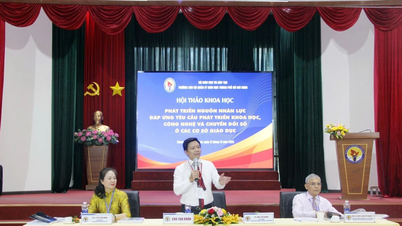Guided by the direction of the 14th National Congress and the need for substantive innovation, Dr. Sai Cong Hong, former Deputy Director of the Secondary Education Department, Ministry of Education and Training , has offered analyses and suggestions on the path of digital transformation in education, particularly emphasizing that success cannot rely solely on modern infrastructure and equipment, but must begin with quality digital content and the competence of digital teachers.
In the Draft Political Report submitted to the 14th National Congress of the Party, digital transformation is identified as one of the key drivers of early childhood and distance education development, with the content: "Integrating digital competencies into the general education curriculum."
The specific action plan is: "Develop and implement a digital human resource development program to equip workers with comprehensive digital skills, meeting the requirements of digital economic and social development."
This is a strategically significant direction, affirming that digital transformation is not just a trend but an essential requirement for fundamental and comprehensive educational reform. For digital transformation to be effective, it is crucial to start by building human resources, digital capabilities, and developing high-quality digital content, rather than simply investing in infrastructure and equipment.
Digital transformation is not just about bringing technology into the classroom, but about digitizing knowledge and innovating the content, methods, and forms of learning. Without well-designed, scientifically-based digital content, all modern technologies, software, and equipment are merely "empty shells."
Therefore, it is crucial to understand that digital content is the foundation and soul of digital transformation in education.
Many positive results have been achieved, but they are still largely superficial.
In recent years, especially after the Covid-19 pandemic, Vietnamese education has achieved many positive results in applying technology and promoting digital transformation.
Most educational institutions have implemented electronic gradebooks, electronic student records, and online student management; many schools have used teaching platforms such as ViettelStudy, K12Online, Google Classroom, Zoom, Azota… Some have even built their own electronic learning resource repositories, question banks, and online learning systems.

A kindergarten teacher and students in Ho Chi Minh City during a lesson using electronic devices (Photo: Huyen Nguyen).
However, a closer look at the practical reality reveals that this process only reflects the tip of the iceberg of digital transformation. The majority of activities remain at the management level and haven't truly innovated teaching methods.
Many places equate "digital transformation" with "teaching using PowerPoint" or "recording lectures," while the teaching content has not been redesigned to suit the digital environment. As a result, teaching remains passive, with teachers still lecturing in a one-way manner, the only difference being the "shift from the blackboard to the screen."
Electronic lesson plans and electronic lessons must be understood correctly.
One underlying reason why digital transformation in education remains largely superficial is the misunderstanding of the concepts of "electronic lesson plans" and "electronic lessons".
In essence, a true digital lesson plan is a complete digitized pedagogical design, comprising all the necessary components: clear learning objectives, multimedia digital content (text, images, videos, simulations, etc.), methods for organizing online learning, assessment tools, feedback, and guidance for students' self-study.
Similarly, an e-learning lesson is not just a video or a slide, but a digital learning process that involves interaction, feedback, and self-assessment by students.
Without these elements, the lesson will be purely technical and lack pedagogical value. Therefore, before investing in infrastructure, the education sector needs to standardize the concept and professional requirements for digital content.
Only when understood correctly and implemented properly will digital transformation truly go in-depth and contribute to the genuine innovation of teaching and learning.




Teachers – at the heart of the digital transformation process.
In the age of technology, teachers remain the key factor in the success of digital transformation. Teachers are not only users of technology, but also "architects of digital knowledge," designing, creating, and coordinating learning activities in the digital environment.
Teachers understand their students best and know how to choose the right content, methods, and tools. Therefore, only they can create digital content with genuine pedagogical value.
However, it's important to recognize that not all content can or should be digitized. Lessons in ethics, life skills, physical education, or the arts still need to be delivered in a physical environment so that students can experience and feel them firsthand.
A balanced combination of in-person and online learning (blended learning) will help leverage the strengths of technology without losing the humanistic essence of education.
To enable teachers to effectively fulfill their roles in the new era, comprehensive and ongoing digital skills training programs are necessary. Government agencies should promptly issue digital competency standards for teachers, clearly defining requirements for skills in designing digital lesson plans, organizing digital teaching and learning, and assessing online learning.

Teachers are a crucial factor in digital transformation (Illustrative image: Huyen Nguyen).
At the same time, there is a need for policies to encourage the creation of digital content – recognizing high-quality e-lectures and digital learning materials as professional products, with mechanisms for evaluation, copyright protection, and sharing within the national open educational resource system.
In parallel, a national digital content standard framework should be established to serve as a basis for guiding the development of unified, safe, and appropriate learning materials that reflect Vietnamese identity.
The establishment of a national digital learning resource center is also a necessary step, providing teachers with a place to share, collaborate, and jointly develop high-quality learning materials for the entire education system.
Preserving the humanistic essence of education in the digital age.
No matter how advanced technology becomes, education remains a human endeavor. No software can replace the emotions, dedication, and heart of a teacher.
A digital lesson may be engaging, but it cannot replace the encouraging gaze or words of a teacher for their students. Therefore, digital transformation is only meaningful when technology serves humanity, not when it overshadows the humanistic values of teaching. Maintaining that is preserving the core of education – where people are at the center and technology is merely a tool.
Digital transformation in education is an inevitable trend, but to succeed, it must begin with quality digital content and innovative digital teachers.

Teachers in Ho Chi Minh City learn about robot models within the framework of "Ho Chi Minh City Digital Transformation Week 2023" (Photo: Huyen Nguyen).
A truly effective digital lesson plan cannot be just a few slides; it must be a learning blueprint that integrates content, methods, interaction, and self-assessment.
Teachers should not only "teach using technology," but "teach with technology," using technology as a tool to spark students' interest in learning and develop their abilities.
Only when understood and implemented correctly can digital transformation truly become a profound knowledge revolution, contributing to the realization of the spirit of the Draft Political Report of the 14th National Congress of the Party: "Building a modern national education system, on par with the region and the world."
Source: https://dantri.com.vn/giao-duc/chuyen-doi-so-trong-giao-duc-bat-dau-tu-noi-dung-so-va-nguoi-thay-so-20251101071521722.htm




![[Photo] Prime Minister Pham Minh Chinh attends the Conference on the Implementation of Tasks for 2026 of the Industry and Trade Sector](/_next/image?url=https%3A%2F%2Fvphoto.vietnam.vn%2Fthumb%2F1200x675%2Fvietnam%2Fresource%2FIMAGE%2F2025%2F12%2F19%2F1766159500458_ndo_br_shared31-jpg.webp&w=3840&q=75)











































































































Comment (0)